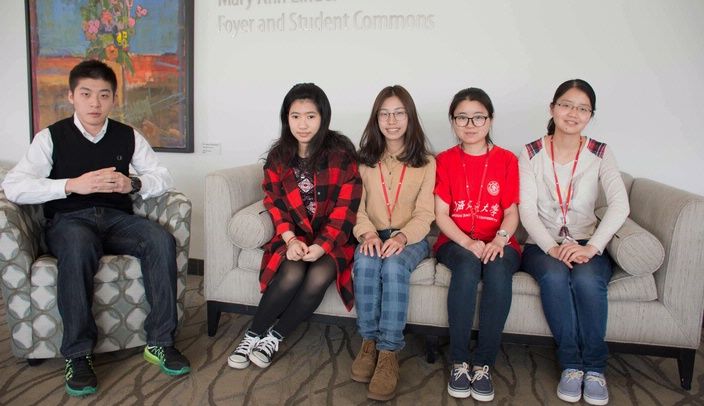Since 2006, the College of Nursing at UNMC has hosted short-term exchange students from nursing programs in Shanghai. More than 60 students from Shanghai Jiao Tong University School of Nursing and Tongji University have participated in the program.
This year six students from Shanghai Jiao Tong University and four students from Tongji University have visited or are visiting UNMC.
On March 11, the Shanghai Jiao Tong nursing students gave a presentation about their time in Omaha.
They discussed the similarities and differences between Shanghai Jiao Tong University and UNMC.
In terms of education, they said that education at UNMC’s College of Nursing is active, free, and relaxing, while in China it is quiet and strict.
The clinical setting is different as well. In Chinese hospitals, there can be three to ten people staying in a hospital room, compared with two people at Nebraska Medicine. Nurses see many more patients per day in China, so they do not often have time to input as much data about the patients’ conditions as they do in the U.S.
The nursing profession also differs, they said. There are only two types of nurses in China – nurses and nurse-managers. These nurses work fulltime – eight hours a day for five days a week. There are no part-time nurses like there are in the U.S. Another difference is that there are more male nurses in the U.S, said Xiang "Gary" Zhang, the only male of the group.
In the U.S., patients respect nurses much more than they do in China. In China, nurses are viewed as the people who give injections. This is a two-sided educational problem, the students said. On one side, patients need more education in the roles and training of nursing staff. One student related a story of how she tried to give a patient advice about his condition. He turned to her and said, "You’re not a doctor. Why should I listen to you?" On the other side, the level of education for nurses in China can vary widely. Some can start training at the age of sixteen, and they only receive "technical nursing" training. Others, like those at Shanghai Jiao Tong and Tongji, receive a bachelor’s or master’s degree in nursing. Standardization of nurses’ training would help increase trust in nurses and understanding of their roles in patient treatment.
Sheila Ryan, Ph.D., Director of International Programs at the College of Nursing, addressed the students after their presentation. She said, "You have accomplished a lot in the short time that you have been here. I hope that you return to China with a good impression of nurses in the U.S., of Omaha, and of UNMC. Please feel free to come back to UNMC at any time."
